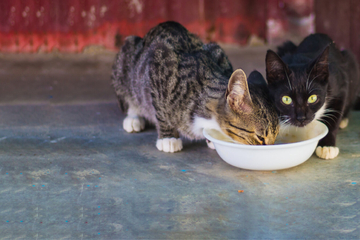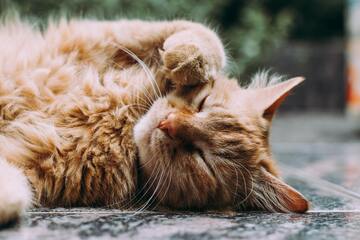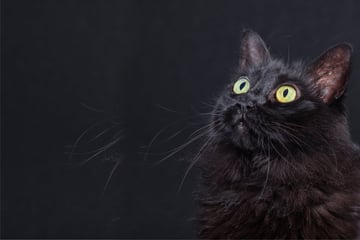What is cat grass and is it good for your kitty?
Does my cat need cat grass? Is cat grass good for cats? What even is cat grass? Cat parents definitely deal with this slew of questions, and TAG24 is here to help.
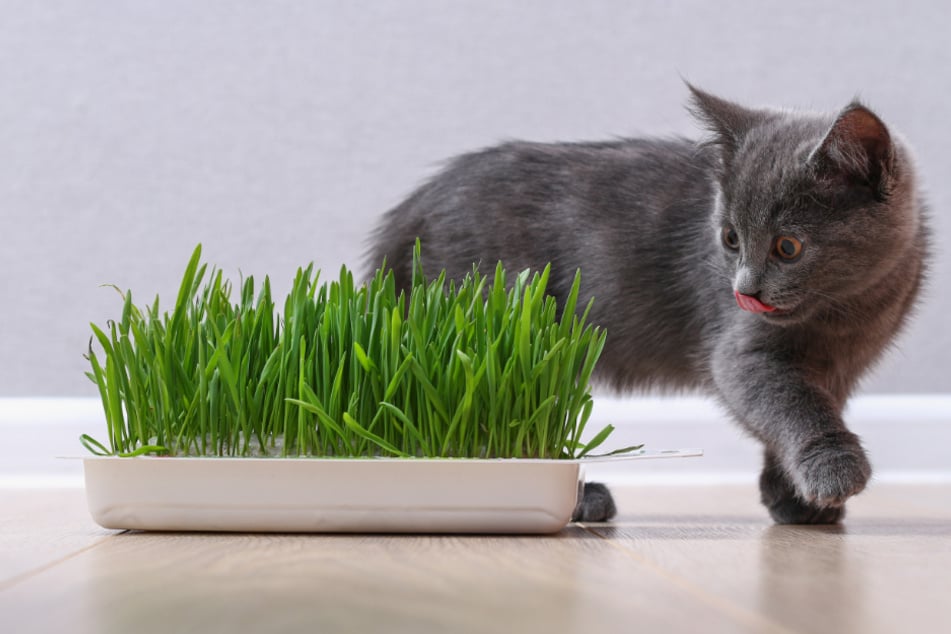
If you were to observe an outdoor cat going about its business, you might notice that the furry friend likes to eat grass here and there.
It's completely normal for cats to eat grass, and there's nothing to worry about. But apartment cats rarely get the same opportunity. Instead, this can result in cats resorting to indoor plants to get their fill, or – in the worst case scenario – eating ribbon, yarn, or bits and bobs around the house.
To help cats with their need to feed on and play with grass, cat grass is commercially available across the world. With a huge variety of different grass types, it's often difficult for cat owners to judge which ones are legitimately safe for cats, and which ones aren't.
This cat guide takes you through the wild world of cat grass, and whether it's a good idea for your feline friend.
What is cat grass?
Cat grass is basically any grass that has been grown specifically for use by cats.
It is typically indoor grass, used by indoor cats whom have no access to standard "outside" grass.
Offered for sale in hardware stores, pet stores, or nurseries, cat grass is usually sprouted wheat, but other grasses can also be suitable for cats.
What kinds of grass are safe?
There are many different types of cat grass available, with some more suitable for certain cat breeds than others.
A few grass types that are suitable as cat grass are:
- Wheat
- Oats
- Millet
- Barley
- Rye
This is not an exhaustive list, but a short list of a few common choices. Wheat grass is one of the most common cat grasses, but not the only one. As a general rule, make sure that the blades of the cat grass you choose are soft and don't have sharp edges or pointy tips.
Pro Tip: When buying cat grass, run your finger over the blade of grass against the grain. If you feel barbs, you shouldn't buy this grass for your cat. Additionally, if you buy ready-made cat grass or seeds, make sure that it is pesticide and fertilizer free.
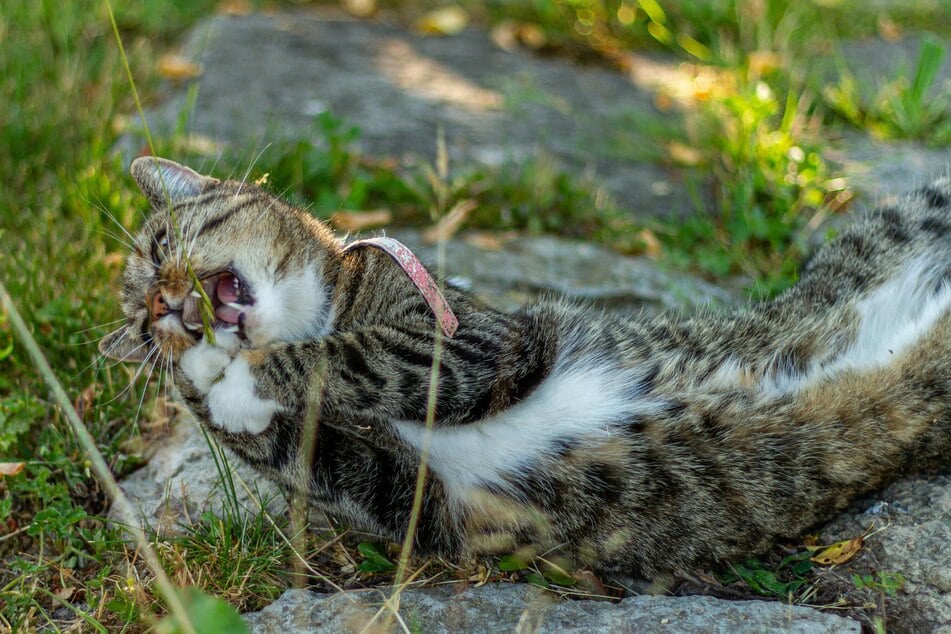
What does cat grass do?
Cat grass mostly serves as a nutritional supplement for cats, because after eating it, they vomit more easily and can help expunge hairballs or anything that's upsetting their stomach.
Cat grass also serves a number of other functions. Here are six cat grass benefits:
- To aid digestion (as a natural laxative)
- Cat grass helps cats pass hairballs through their system and regurgitate them if they are too big, reducing the quantity of hair in their gut.
- The taste, smell, and chemicals contained within cat grass can actually help keep a cat's breath fresh.
- To help with the absorption of folic acid (which helps the formation of blood cells and cell renewal)
- They like the taste
- Cats sometime eat cat grass out of boredom
Cat grass is a great treat for most cats, and is especially recommended for indoor cats.
Pro Tip: A dedicated cat meadow in the apartment or on the balcony acts as an excellent resting area and playground for your kitty. A fresh grassy area can also provide cooling for cats in the summer.
Is cat grass dangerous for cats?
All responsible cat owners are concerned with the welfare of their own kitty. Since cats usually vomit up cat grass after eating it, along with the contents of their stomach, it is reasonable for someone to conclude that cat grass isn't particularly good for them. T
his is far from the truth, however, as cat grass is actually good for cats. That being said, though, there are a few dangers to consider with cat grass.
Potential dangers of cat grass:
- If the blades of cat grass are too sharp, it could cause cuts and inflammation in the cat's throat.
- The blades of grass could get stuck in the cat's nose or throat
- Harmful substances, such as pesticides and fertilizers on or in the cat grass, could be harmful to the cat's health.
- Some cats might have an allergic reaction to specific types of cat grass
In principle, though, cat grass is not harmful to feline health. Owners should pay attention and buy good quality and soft grass.
Pro Tip: You should always take good care of cat grass. By regularly watering and trimming the blades of grass, it will stay fresh and soft. The risk that your cat will swallow too large a blade of grass is also greatly diminished if you keep it trimmed.
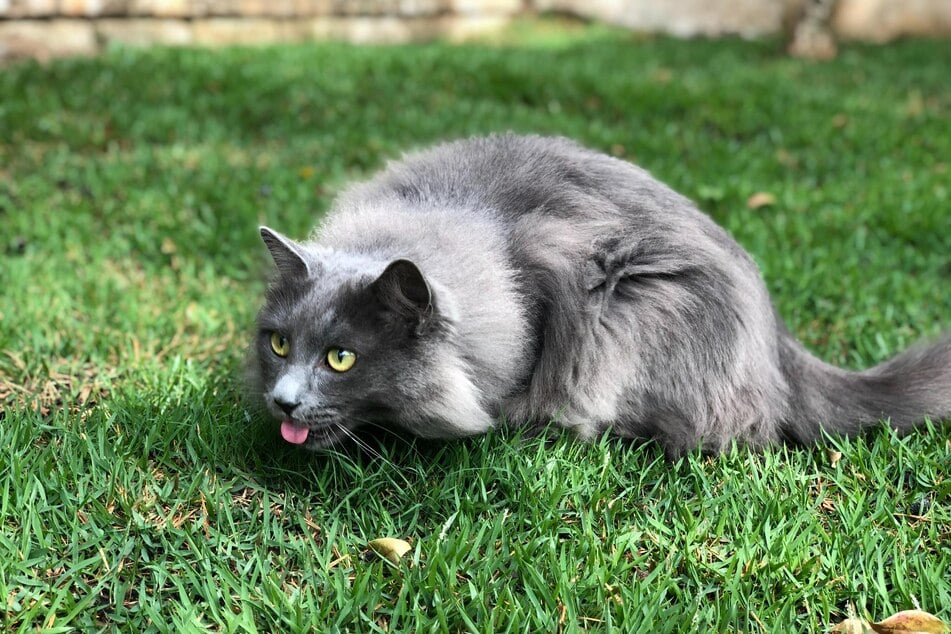
Cat grass: When should I give it to my cat?
Cat owners should offer cat grass if they own an indoor cat, or if their cat begins to eat household plants. Additionally, if a cat's excrement resembles a string of pearls, it should also be given cat grass or similar to help with its digestion.
Cat grass is especially recommended for indoor cats, but can also be useful for outdoor cats. Unlike outdoor cats, apartment cats don't have access to wild or garden grasses, and their digestion is generally a bit slower because they move less than outdoor cats. Due to this reality, indoor cats often need a little more help with their digestion than outdoor cats.
Hairballs that are too large, or too many hairballs, can actually lead to intestinal obstruction and other digestive problems for cats. This is why it's important to supply your cat with grass and make sure that it is taken to the vet if their vomit has blood in it.
How much cat grass should a cat eat?
Most cats intuitively eat as much grass as they need if it is available to them, so it is best if they have relatively unrestricted access to as much as possible. That being said, if the grass is not as fresh anymore, and has been chewed up, it's a good idea to take it away and let it regrow a bit away from the cat.
You should also pay attention to the contents of your cat's vomit to see if it needs to consume more cat grass, and also to make sure that it isn't vomiting up anything that could suggest that it is sick in some other way.
If your cat is vomiting up a few blades of grass along with a hairball, and the liquid is relatively colorless (or maybe a little pink), then this is completely normal and actually good for the cat. If the cat vomits blood, however, it should be taken to a veterinarian as soon as possible.
Is cat grass suitable for kittens?
If your little kittens are still with their mother, their mom will take over grooming duty. In this case, hardly any hair will get into the kittens' digestive system, but significantly more will get into the mother's stomach.
As soon as kittens start to groom themselves, soft and fresh cat grass is recommended. Additionally, cat grass should be made readily available to the mother cat so that she can regulate her digestion and combat furballs.
The consumption of grass is intuitive, natural, and instinctive for cats. This is why they themselves will determine the right time to eat it. In the end, the only thing you need to do is make sure that there is cat grass available to them.
Alternatives to cat grass
Cat grass is very useful for cats, and can help keep them strong, fit and healthy.
That being said, it might not always be the right choice for every cat household. For starters, it can be quite expensive to purchase in the long run. The grass also needs to be cared for and, let's be real, it isn't particularly pleasant that cat grass causes cats to vomit more regularly.
Some cats also just simply aren't interested in, or don't like, cat grass. If any of these factors affect you, and you're struggling with a cat grass-related conundrum, don't fear - here are some alternatives:
Malt paste
A very popular and simple alternative to cat grass is malt paste, a substance that will make it easier for the cat to digest and eliminate hairballs. It is often sufficient to give the cat a small amount of malt paste per day. The exact dosage depends on the size and weight of the cat, and appropriate medical advice should be sought after from your vet before you go down this route.
Grass snacks
Grass snacks and treats for cats are available in pet stores to help with digestion and to also help eliminate cat hair. As with all snacks for cats, cat owners should pay attention to the respective ingredients and only give their kitty appropriate amounts.
Coat care
Good grooming, often by brushing your cat quite regularly, already removes many loose hairs from the cat's coat, so that it swallows less when cleaning itself. A positive side effect is that brushing can strengthen the relationship between owner and animal if it becomes a common.
Green lily
This is a non-toxic green plant that functions fantastically as an alternative to cat grass. Keep in mind, though, that smoking households should refrain from using it because this air-purifying plant absorbs the pollutants in the air. When it comes to cigarettes, these chemical pollutants include benzene, nicotine, and formaldehyde, all of which are very bad for cats and may be ingested through the green lily.
Warning: Cyprus grass or dwarf Cyprus grass can cause injury to a cat's mouth and are therefore not recommended. Additionally, neither valerian nor catnip are a substitute for cat grass, as these plants have a completely different effect on cats.
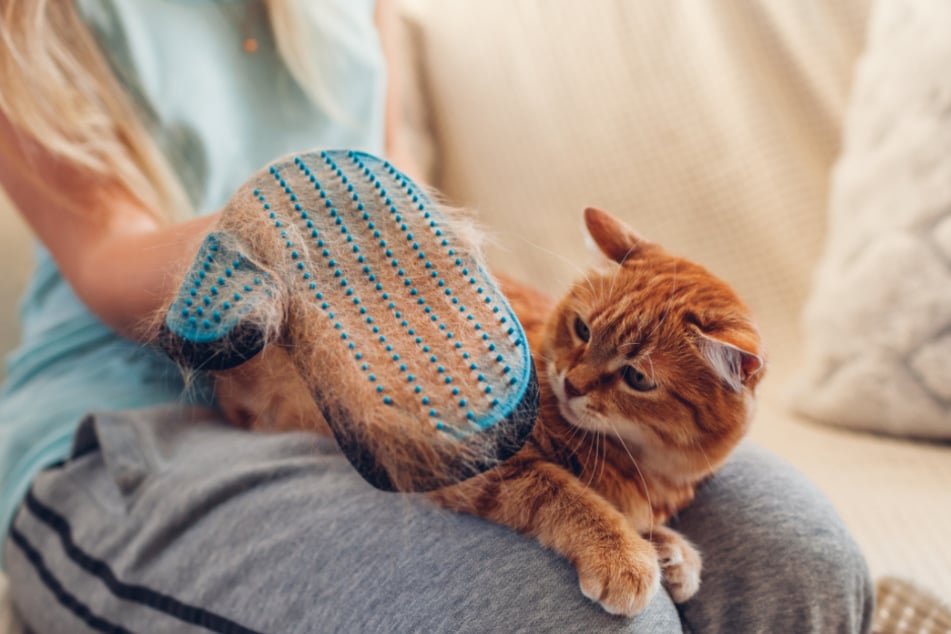
Is cat grass good for my cat?
Offering your cat high-quality and soft cat grass, or an appropriate alternative, is necessary. This especially goes for indoor cats, and helps the animal digest hairballs.
It might be expensive and hard to maintain at times, but cat grass is invaluable for indoor cats that do not get access to normal outdoor grass on a regular basis.
The health benefits of cat grass are immense, and the disadvantages and dangers to your feline are very minimal.
To be honest, cat grass is usually a win-win for both the cat and owner.
Cover photo: 123rf/detry

